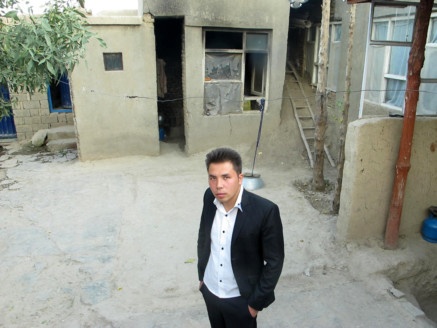
For the tens of thousands of Afghan migrants fleeing to Europe, the hardest part of the journey may not be the perilous trip across the Mediterranean Sea. Before they navigate that risk, many have to get through Iran.
That step on the Afghans’ westward journey is being met by an abusive crackdown from Iranian security officials, according to Afghans who say they have faced arrest, beatings, torture and gunfire from Iranian guards blocking access to Turkey.
The stories of abuse are surprising mostly because Iran has a history of some hospitality for Afghans, accepting more than 2 million refugees during the 1980s and 1990s as Afghans fled the Soviet occupation and subsequent civil war.
Now that Afghans are trying to use Iran as a pathway to Europe, that warmth has shifted, affecting as many as 80,000 Afghans who, according to unofficial government statistics, have fled the country this year, with most hoping to settle in western and northern Europe.
Government leaders in Kabul are pleading with residents to stay home instead of testing the patience of Iranian officials, after reports that dozens of Afghans heading to Europe have been killed in Iran in recent weeks.
“They cut a water pipe and were beating us with water pipes,” said Mortaz Ibrahimi, an Afghan teenager arrested by Iranian authorities near the Turkish border in late July. “It was beating after beating.”
According to Afghan officials, Iran has justified its harsh treatment of refugees as essential in the effort to prevent foreigners from joining Daesh (the self-proclaimed Islamic State of Iraq and the Levant), the militant group battling Iran’s allies in Syria and Iraq.
“The Iranian government has violated the rights of these people, but the Iranian government told the Afghan government: ‘Do something to stop these people’,” said Islamuddin Juraat, a spokesman for the Afghan Ministry of Refugees and Repatriations. He said that Iranian Interior Minister Abdolreza Rahmani Fazli was in Kabul in September to deliver the message. “They told us they are very serious.”
Iran’s ambassador to Kabul, Mohammad Reza Bahrami, declined an interview request, as did his spokesman. Iranian officials also did not reply to written questions about the allegations.
Afghan refugees caught attempting to sneak into Turkey say they are being detained and interrogated in prisons in Iran — even though many of them have no ideological link to Daesh.
There are about 1 million registered Afghans living in Iran, many of whom hold low-skill, low-paying jobs. But in recent years, Iranian authorities have been steadily making it more difficult for Afghans to remain in the country. Hundreds of thousands of Afghans are deported each year, including those who had been born in Iran decades ago.
More than a dozen of Iran’s 31 provinces have enacted bans on Afghans living or working there, so most Afghans are clustered near several major cities, including the capital, Tehran. Afghan workers in Iran send about $500 million (Dh1.84 billion) in remittances to Afghanistan each year.
Human rights officials have repeatedly lambasted the Iranian government for its policy of arbitrary deportations, cruel working conditions for Afghan refugees and a spate of executions targeting Afghans convicted of nonviolent crimes.
Interviews with Afghans who were imprisoned in Iran this summer while trying to reach Europe show the extent of the danger.
One of those interviewed, Ali Reza Samandari, said he decided to leave Afghanistan out of concern that the Taliban could sweep back into power in Kabul, the capital.
So Samandari, 22, quit his job as a TV news cameramen and paid $1,000 for an Iranian visa and a flight to Tehran. Then he plotted on a map how he would fly to Tehran, cross the border into Turkey, cross the Aegean Sea by boat and walk through at least eight countries before reaching Norway, his chosen destination.
After arriving in Tehran in early July, Samandari said, he paid a smuggler $700 to transport him in the back of a fruit truck to the Turkish border. Crammed in with 70 other Afghans in the windowless container, Samandari and the others were dropped off about five miles from the border.
But as they camped in a field waiting for their smuggler’s help to cross the border, several men armed with pistols and assault rifles stormed in and robbed the Afghans of their cash, cellphones and backpacks. An hour later, as the scared Afghans were huddled in a field, Iranian border agents burst into the camp and arrested all of them.
“They were yelling at us, ‘You are using this road to go to Turkey so you can join Isis [Daesh]’,” said Samandari. “We were telling them, ‘No, we want to flee Isis’.“
After being tied up, Samandari said the Iranian guards beat him. He was then shuffled from prison to prison, including one that housed at least 2,500 other Afghans who had also been arrested for trying to cross into Turkey, he said. During the day, Samandari said he and other prisoners were forced to work in the homes of Iranian police officers.
“They were forcing us to do chores, such as washing their cars, cleaning their houses, cleaning their back yard,” Samandari said. “And, if anyone resisted, they came and beat up that person badly.”
Another Afghan, Ali Shah Yaqubi, 22, said he was detained in Iran for several weeks this summer after he was caught trying to cross the border into Turkey.
When they reached a police station, Iranian authorities gave prisoners a blunt ultimatum: “They said, ‘Either you go back to Afghanistan now, or we are going to send you to Syria to fight for the Syrian government’,” Yaqubi said.
Since last year, several news organisations have published stories detailing how Afghan refugees from Iran have been spotted in Syria fighting for President Bashar Al Assad. Iranian officials have denied they are forcing refugees to fight in Syria. Afghan government officials say they have not been able to substantiate the reports.
In his case, Yaqubi quickly agreed to be returned to Afghanistan. Before he was released, though, Iranian police officers demanded that he pay them $50 to drive him to the border.
Mohammad Musa Mahmodi, executive director of Afghanistan Independent Human Rights Commission, said he and other officials are still trying to determine how many Afghan refugees are imprisoned in Iran.
Mahmodi said the reports of abuse are all the more shocking because teenagers account for a significant share of Afghanistan’s migrant population.
“Young Afghans feel as if they have no future here,” Mahmodi said.
Afghan teenagers, he said, are particularly vulnerable to pitches from smugglers promising a safe, hassle-free journey to Europe. Parents in Afghanistan also mistakenly believe that European nations are more likely to approve asylum requests from minors, officials said.
Ibrahimi, the teenager arrested near Turkey in July, was just 16 at the time, having dropped out of school so that he could attempt to travel to Sweden with his uncle. After collecting $600 from his parents — their entire savings, he said — Ibrahimi hired a smuggler who dropped him off in northwestern Iran among a group of perhaps 70 migrants.
But one migrant was shot and killed when the group was intercepted by Iranian border guards, Ibrahimi said, and he and others were arrested, beaten up and accused of trying to flee Syria to join Daesh.
“I was humiliated,” Ibrahimi said. “They had sticks in their hands and basically acted like they were shepherds and we were flocks of animals.”
Despite such stories, the number of Afghans trying to make the trip to Europe shows no sign of subsiding. Hundreds of Afghans line up each morning at the Iranian Embassy in Kabul trying to get a visa.
Ahmad Shah, a visa broker who helps expedite applications, said his business is up by 40 per cent — and that 80 per cent of applicants are hoping to travel through Iran towards Europe. Fears over security and joblessness are so widespread in Afghanistan, he said, that many of his customers return for a visa even after they’ve been arrested in Iran.
“People come back here, show their backs with marks of torture and beating from Iranian guards, but say they want to try again,” Shah said. “They just want to get to a secure place, which is Europe.”
–Washington Post












